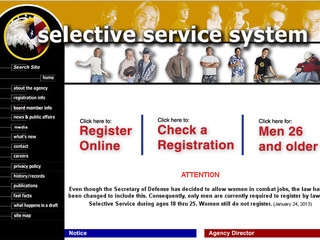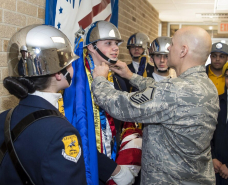No draft, but not signing up can be hurdle

The last time Danieldevel Davis got out of prison it was 2012 and he was 38.
He'd been locked up for six years, which was the longest he'd ever lived in one place. Davis grew up in foster homes, dropped out of school in the 11th grade, and then hit the revolving door: streets, juvenile detention, streets, prison. He's never possessed a driver's license. He's never had a bill in his name.
"I've never had anything in my name," he says.
So, this is what happened when Davis went to fill out his financial aid paperwork at a Virginia Beach technical college.
"Have you registered for the Selective Service?" the financial aid officer asked.
"What do you mean?" Davis said.
"Did you register to be drafted?"
"Huh?"
This may be a nation with an all-volunteer military, one that ended conscription more than 40 years ago, but federal law still requires men 18 to 25 to register for a draft that does not exist. There are few exemptions and no second chances.
Davis never registered with the Selective Service System and so learned that he was looking at potentially lifelong consequences. No access to federal student loans or grants. No federal job training money or certain government jobs. And, in Virginia, no driver's license.
"I didn't know I had to register and now I can't get anything," Davis says.
The odds of this country returning to a draft are almost zero, but the price for failure to register is high and is largely born by the men who can ill afford to pay it: high school dropouts, disconnected inner city residents, ex-offenders, and immigrants - legal and unauthorized - who do not know that failure to register can jeopardize citizenship. In other words, those precisely in need of the type of job training, education, and citizenship opportunities that could help move them from the margins to the mainstream.
In California, the Selective Service System estimates, men who failed to register were denied access to more than $99 million in federal and state financial aid and job training benefits between 2007 and April of this year. Pennsylvania, New Jersey, and Massachusetts saw $35 million in combined lost benefits between 2011 and spring 2014.
"Why are we setting up these barriers?" says Regina Tyler, director of Virginia State University's Upward Bound program and the Education Opportunity Center, which helps adults return to school. "Why are we attaching them to financial aid? We don't have a draft, so what is the point?"
The point, supporters of registration long have argued, is that almost-zero odds of conscription are not zero odds.
"You can never say never," says Lawrence Romo, director of the Selective Service System. "We are a deterrent. We want to make sure our adversaries understand that if we had an extreme national emergency, we would have the draft."
A fair and equitable draft, which would include alternatives to military service, requires 100 percent compliance, he argues. "We need to have some type of penalty in order to help us get that compliance."
The agency grants few exceptions, but, Romo emphasizes, it is ultimately up to the financial aid officer or the workforce specialist - the agency dispensing the benefit - to decide whether someone "knowingly and willfully" violated the law and therefore should be denied.
A majority of men do register - 2.5 million in 2013 alone. The agency casts a huge, largely effective dragnet in high schools, motor vehicle departments, post offices, and elsewhere. The average compliance rate nationally among 19-year-olds who registered last year was 89 percent.
By far, the agency's most successful tool to enforce compliance lies in the issuance of state driver's licenses. Forty states, the District of Columbia, and four U.S. territories now tie issuance or renewal of driver's licenses to Selective Service registration. Most of those have moved to an automatic registration. Other have opt-in or opt-out provisions.
Until a few days ago, Davis did not realize that in the phrase "knowingly and willfully" lies his hope. He thinks he can prove to a financial aid officer that he did not deliberately evade his duty. He's calling his former probation officer to get his juvenile and adult criminal records and is trying to figure out how to get his school records. Davis is building his case.
Source: Philly.com
Countering Military Recruitment

WRI's new booklet, Countering Military Recruitment: Learning the lessons of counter-recruitment campaigns internationally, is out now. The booklet includes examples of campaigning against youth militarisation across different countries with the contribution of grassroot activists.
You can order a paperback version here.







